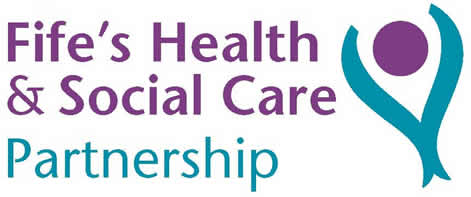SOCIAL WORK SERVICE
HOME SUPPORT SERVICES
COMMUNITY ALARM AND TELECARE SERVICE
Helping you live independently

Fife Health and Social Care Partnership
The Community Alarm and Telecare Service is designed to help people like
yourself, live independently in your own home, safe in the knowledge that should an emergency occur, day or night, assistance will be provided.
How does the Community Alarm work?
An alarm unit will be installed in your home. The alarm needs to be plugged into an electrical socket and requires a working telephone line. You will also be issued with a pendant which can be worn around the neck, or on a wrist strap.
When an emergency occurs and you require help, you simply press the button and the alarm is activated. The call is directed to the Control Centre and alerts an operator that you need assistance. The operator will be able to speak to you through the Community Alarm to appraise the situation and provide reassurance. The operator will quickly take the appropriate action. This action may be contacting:
- Friends / Family
- Neighbour
- Doctor
- Emergency Services
If the operator is unable to contact a nominated person, then a Mobile Emergency Carer will be sent to assist you.
If for any reason you are unable to respond to the operator, an Emergency carer will always be sent to check out the situation.
Do I qualify to join the Service?
To qualify to join the scheme, you must be:
- Living alone or frequently left alone or cared for by a resident helper who cannot leave the person or premises.
- At risk due to:
- III health
- Frailty
- Disability
- Extreme anxiety
- Isolation
- Able to understand how the system works and physically capable of using it.
What is the Telecare Service?
Living independently is a concern for many people who worry about having
an accident at home. Telecare takes Community Alarms to a new level, by cleverly combining a range of wireless sensors and detectors to help manage risk and raise the alarm if a danger is detected. The sensors are linked through your phone line to a 24 hour Control Centre, where a specialist operator will automatically be alerted in an emergency. They will contact you immediately to check on your wellbeing and take appropriate action, whether that is to contact a nominated person, the Emergency Services or a Fife Council Emergency Carer.
Here are some examples of situations where Telecare can help you:
- Falls
- Risks created by Dementia
- Bogus callers
- Carbon Monoxide
- Flood
- Fire
- Anxiety about security when living alone.
The service is available for vulnerable people who would like to feel safer, more protected and independent in their own home. The service benefits those:
- Who are frail or unsteady on their feet
- Affected by dementia
- Who have been discharged from hospital and need additional support at home
- With high anxiety living alone
- With sensory loss
- Physical/learning disability
How much will this cost me?
There is no charge for the Telecare Service, however a Community Alarm monitoring fee is required (please refer to the Charging Leaflet for more information). There may also be costs involved when the Community Alarm system is first installed, as well as ongoing running costs.
As previously mentioned the running costs must be met by the Householder and includes:
Electricity
- The alarms uses about one unit of electricity per week ( cost is dependent on your supplier)
Line Rental
- This is charged directly to you telephone service provider.
Call Charges
- All calls, including alarm calls are charged in the same way as your current phone bill.
Who should I or my family contact to find out more?
If you feel you would benefit from this Service, please contact: 03451 551503
This publication can be made accessible on request in Braille, large print- or on vtdeotspe, in British Sign Language or in a different language. Please contact PiJUline Doherty on 0345155555 ext441107.
The above information is from a Fife Health and Social Care Partnership pamphlet I picked up at my Doctors practice
The below images are from the Fife Health and Social Care Partnership pamphlet
